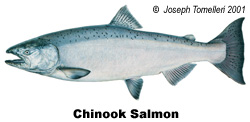What is a Chinook Salmon?
Species Profile
Chinook salmon (Onchorhynchus tshawytscha) are anadromous fish, meaning they migrate to the ocean as smolts and return to fresh water to spawn and then die.
This native fish is one of the most fascinating fishes found in Idaho, its body is silver to olive-colored. The inside of its mouth is unique; it's black. They range from 18-40 inches and can attain a weight of 45 pounds.
Idaho's chinook salmon are often loosely separated into three groups - Spring, Summer and Fall, based on their size and ocean life history.
Life History
Chinook return to their spawning habitat in the fall after one to three years at sea. The female builds a large redd (nest) that may be six feet in diameter and one to four feet deep.
They lay between 4,500 and 10,000 eggs. When spawning is completed, both male and female die. The eggs hatch in the spring and the juvenile fish live the next year in fresh water, except for fall chinook that only live a couple months in fresh water before leaving for the ocean.
Feeding Habits
Young fish in fresh water eat both aquatic and terrestrial insects. They turn to a diet of fish once they reach salt water. Adults returning to spawn do not eat; they live off their fat reserves.


